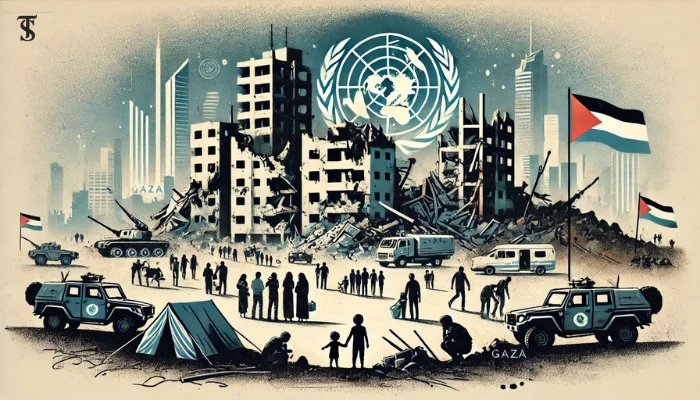Gaza Crisis Exposes Western World’s Moral Dilemma: A Test of Democratic Values
International Community Grapples with Humanitarian Concerns Amid Escalating Conflict
The ongoing crisis in Gaza has thrust the Western world into an unprecedented moral reckoning, forcing democratic nations to confront fundamental questions about human rights, international law, and their own stated values. As the humanitarian situation deteriorates, governments across Europe and North America find themselves navigating between diplomatic obligations and growing public pressure for decisive action.
The Weight of Conscience
The conflict has created what many analysts describe as a “crisis of conscience” for Western democracies. Citizens across major capitals have taken to the streets in unprecedented numbers, demanding their governments take stronger stances on what they perceive as grave humanitarian violations.
“We’re witnessing a moment where the gap between public sentiment and official policy has never been wider,” explains Dr. Sarah Mitchell, a Middle East policy expert at the International Relations Institute. “Democratic governments are struggling to reconcile their strategic interests with the moral imperatives their citizens are demanding.”
Public Opinion Shifts the Narrative
Recent polling data reveals a significant shift in public opinion across Western nations. In the United Kingdom, 67% of respondents expressed concern about the humanitarian situation, while similar figures emerged from France (72%) and Germany (64%). These numbers represent a marked increase from previous surveys conducted just months earlier.
The digital age has amplified these concerns, with social media platforms becoming battlegrounds for competing narratives. Interestingly, the increased focus on security and surveillance during these times has even affected consumer behavior in unexpected ways, with reports showing heightened interest in personal security measures, including searches for cctv camera price in pakistan and similar security equipment across various markets.
Political Ramifications
The crisis has created significant political pressure on Western leaders. In several European capitals, coalition governments face internal tensions as different parties advocate for varying approaches to the conflict.
“This isn’t just about foreign policy anymore,” notes political analyst James Crawford. “It’s become a defining issue for domestic politics, with potential electoral consequences that extend far beyond the immediate crisis.”
The Humanitarian Imperative
International humanitarian organizations have documented alarming statistics from the region. The UN reports that over 2.3 million people require immediate assistance, with critical shortages of medical supplies, food, and clean water affecting the most vulnerable populations.
Dr. Amira Hassan, working with Médecins Sans Frontières, describes the situation as “catastrophic.” She emphasizes, “Every day we delay meaningful intervention, more innocent lives are lost. The international community’s response will be judged by history.”
Economic and Strategic Considerations
Beyond moral arguments, the crisis presents complex economic and strategic challenges for Western nations. Trade relationships, energy security, and regional stability all factor into governmental decision-making processes.
Economic analysts point to potential long-term consequences for global markets, particularly in energy and technology sectors. The uncertainty has led to increased volatility in international markets, affecting everything from oil prices to technology stocks.
The Role of Civil Society
Civil society organizations have emerged as powerful voices in this crisis, organizing protests, lobbying efforts, and awareness campaigns. Their influence on public opinion has been substantial, creating pressure that traditional diplomatic channels cannot ignore.
“Civil society has become the conscience of our democracies,” observes Dr. Elena Rodriguez, a specialist in international relations. “They’re forcing governments to confront uncomfortable truths about their policies and priorities.”
Looking Forward: Paths to Resolution
As the crisis continues, Western governments face mounting pressure to develop coherent, morally consistent policies. The challenge lies in balancing immediate humanitarian concerns with long-term strategic interests.
Several European nations have begun exploring new diplomatic initiatives, while others focus on increasing humanitarian aid. The effectiveness of these approaches remains to be seen, but the urgency of the situation demands swift action.
A Defining Moment
The Gaza crisis represents more than a regional conflict; it has become a defining moment for Western democracy itself. How these nations respond will likely influence their moral authority and leadership credibility for years to come.
As one senior diplomat, speaking on condition of anonymity, reflected: “This crisis has forced us to look in the mirror and ask ourselves what our values really mean when they’re tested by harsh realities. The answer we provide will define us as nations and as a civilization.”
The coming weeks and months will reveal whether Western democracies can navigate this crisis of conscience while maintaining their commitment to both humanitarian principles and strategic interests. The world watches as these nations grapple with one of the most challenging moral and political dilemmas of our time.
The international community continues to monitor developments closely, with humanitarian organizations calling for immediate action to address the growing crisis and its far-reaching implications for global stability and democratic values.


